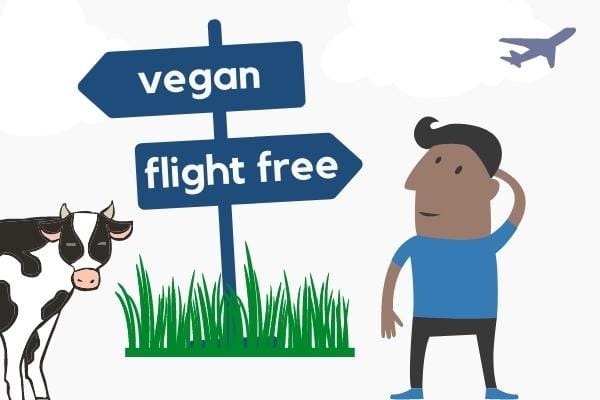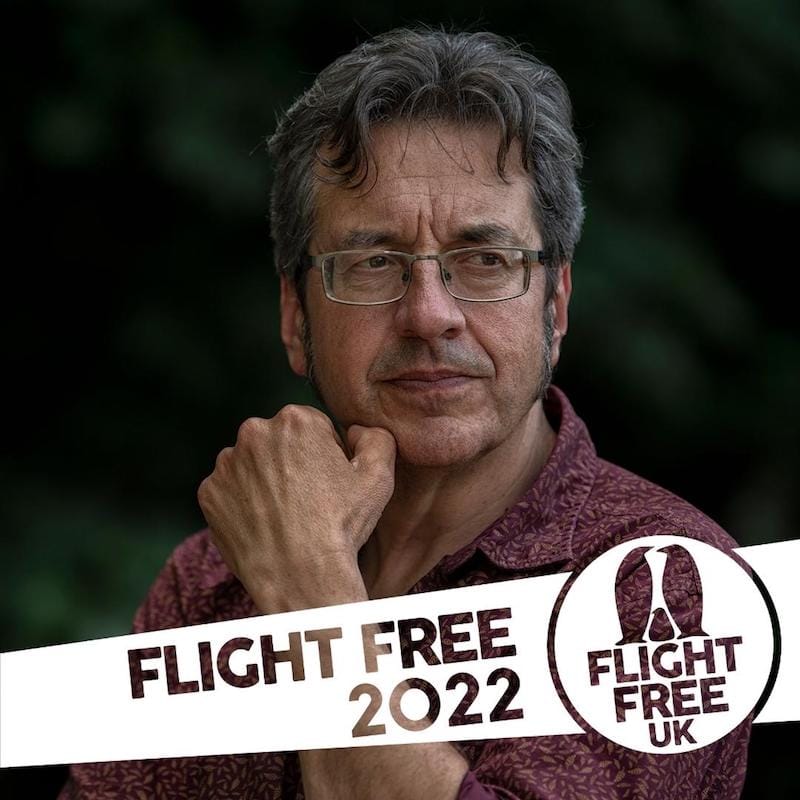Launched in January 2022, our petition asks the Government to change the rules so airlines do not have to fly empty planes in order to keep their landing slots.
When we reached 10,000 signatures, the Government gave a response.
Here is our analysis of that response.
Government response
The Government continues to provide alleviation from normal airport slot rules to prevent airlines from operating environmentally damaging ‘ghost’ flights during the COVID-19 pandemic.
Flight Free UK
It's good that the Government acknowledges that ghost flights are environmentally damaging. But all flights are environmentally damaging, not just empty ones. This sounds as though the Government is jumping on the 'ghost flights' bandwagon following recent news reports.
When the Government says it ‘continues to provide alleviation from normal airport slot rules,’ it means that airlines are required to use 70% of their slots rather than the 'normal' 80%.
Government response cont.
In normal times, slot usage rules are in place to ensure that airport capacity is used effectively, and that competition exists for passengers at our most crowded airports. This supports lower fares, better availability of routes and higher service quality.
Under these rules, airlines that use our most crowded airports (that are slot coordinated under the Worldwide Airport Slot Guidelines) must operate at least 80% of slots during the current season, or risk losing their historic rights: the so-called ‘80:20’ rule.
The COVID-19 pandemic created a severe shock for aviation demand which has continued to remain considerably suppressed. The usual competition rules, which were designed for a situation where airports enjoyed high levels of usage, were not appropriate when demand had fallen close to zero. As such, the rules requiring airlines to use slots in order to retain their historic rights were fully suspended for the Summer 2020, Winter 2020/21 and Summer 2021 seasons.
The UK’s exit from the European Union means that it has been able to take a more tailored approach that reflect the UK’s specific circumstances. The Air Traffic Management and Unmanned Aircraft (ATMUA) Act 2021 provides temporary powers to amend these rules where the evidence supports the need to do so. These powers last until August 2024, covering the Winter 2024/25 season.
Flight Free UK
Never miss a chance to shoehorn in Brexit! It's interesting that the Government is comparing its slot alleviation favourably to the EU. The EU currently requires slots to be used at 64%, a figure kinder to airlines and kinder to the planet.
There are other systems that can be put in place to ensure that airport capacity is used effectively, and that won't result in empty planes in the air.
Government response cont.
As the pandemic has gone on and demand begins to recover, the Government is keen to support recovery. For the current Winter 2021/22 season the Government has used the ATMUA Act 2021 to amend the slot usage retention rules. For Winter 2021/22 this has been reduced from 80% to 50%, and we have also allowed airlines to hand back full series of slots before the start of the season if they are not going to fly them.
The provision to allow airlines to hand back full series of slots goes further than the equivalent alleviation in the European Union for Winter 2021/22 which did not include a full series hand back. By encouraging airlines to hand back their slots where there is insufficient demand, this has dramatically reduced the volume of empty or almost empty flights. This has also provided other airlines with the opportunity to make use of these slots, where there is sufficient demand, with new entrants being awarded temporary slots at some of our most congested airports.
Following a review of the latest available data and evidence, the Secretary of State decided that alleviation remains justified for the Summer 2022 season.
A draft Statutory Instrument setting out arrangements for Summer 2022 was published on 24 January 2022. The measures balance supporting recovery, protection for those carriers operating in markets that are severely restricted and reducing environmental impacts. It sets a minimum usage ratio of 70% and strengthens the provisions for justified non-utilisation of slots.
The strengthened justified non-use provision protects carriers and avoids the environmental impact of empty or almost empty flights flying where COVID-19 related restrictions are in place and avoids empty or almost empty flights to destinations that have onerous travel restrictions. This is because carriers can now use justified non-use provision to cover foreseeable restrictions, even where restrictions are in place before the start of the season. The UK also will now allow for early applications for justified non-use such as where long term restrictions are in place.
Flight Free UK
Justified non-utilisation of slots sounds fair, and sounds as though it could genuinely prevent airlines flying planes for no reason.
However! While the slot allocation was zero, almost 15,000 planes flew at 10% capacity or below. How many more will fly when the slot allocation reaches 70%?
With demand still below ‘normal' capacity, this means that airlines might still end up flying empty planes.
Not even the industry is happy:
“The UK government decision on slots, proposing the highest slot use threshold in the world, makes a mockery of their claims to be supporting the recovery of the airline industry and to be champions of the environment.
“It is inconceivable that international demand will average 70 per cent this summer. The government is therefore condemning airlines to operate thousands of flights at low capacity which is environmentally stupid.”
~ Willie Walsh, director general of the International Air Transport Association (Iata)
In any case, even in ‘normal’ times planes still sometimes fly empty to keep slots, and have done for years.
Government response cont.
These slot alleviation measures are only temporary, however as part of the Government’s future aviation policy we are actively looking at reform to the airport slot allocation process. We are developing the case and options for reforms to make the best use of airport capacity and deliver a better outcome for passengers.
Flight Free UK
The Government has been saying that they are actively looking at reform to the airport slot allocation process since 2018 and so far no progress has been made.
Government response cont.
The Government recognises that the aviation sector has a critical role to play in delivering the UK’s net zero commitments. In July 2021 we published the Jet Zero Consultation which sets out our vision for the sector to reach net zero by 2050. The consultation closed in September and we continue to carefully consider responses in the development of our final Jet Zero Strategy which we aim to publish later this year.
Flight Free UK
The Jet Zero strategy is woefully inadequate as a way of dealing with the climate impact of aviation. Our response is here.
Government response cont.
The Government is already supporting a variety of technology, fuel and market-based measures to address aviation emissions. The Net Zero Strategy published in October 2021 confirmed our commitment to Jet Zero, for the UK to become a world-leader in zero emission flight and to build a world-leading sustainable aviation fuel (SAF) industry. The Government announced £180 million of additional funding for the development of SAF plants in the UK, further supporting our ambition to see 10% SAF blended into the UK fuel mix by 2030.
Flight Free UK
SAF is an excellent example of how Jet Zero plans sound nice but will achieve very little.
SAF usage at 10% is extremely low, and means 90% of the fuel is still fossil fuel. Regulation, speed of development and cost mean that it’s unlikely ever to be above 50%.
In any case, there is very little that's ‘sustainable' about Sustainable Aviation Fuel. The options include biofuel from purpose-grown crops, which is a leading driver of deforestation. Reclaimed biofuel from used cooking oil, or making crude oil from waste plastic sounds better, but this diverts attention away from reducing plastic waste in the first place.
The trouble is that all of these fuels still produce the same amount of greenhouse gas when burned. The emissions ‘savings' come from preventing emissions earlier in the chain, which is difficult to quantify.
E-fuel or synthetic fuel is potentially the closest to a zero carbon fuel, but e-fuels are very energy intensive, and will take renewable energy from other uses which are arguably more important, for example, decarbonising our road transport and the grid.
In addition to SAF, Jet Zero relies on technology that is not ready yet. It also relies heavily on offsetting, and we explore that minefield here.
“Carbon offsetting allows us to keep indulging rather than change behaviour. When you consider the justice issues affecting indigenous communities in terms of land displacement, we can't offset with a clear conscience.”
~ Dr Radhika Mittal, Climate Communicator.
We thank the Government for its response to our petition, and we will continue to push for a Parliamentary debate on this topic. Sign the petition here in order to help us reach the target of 100,000.




